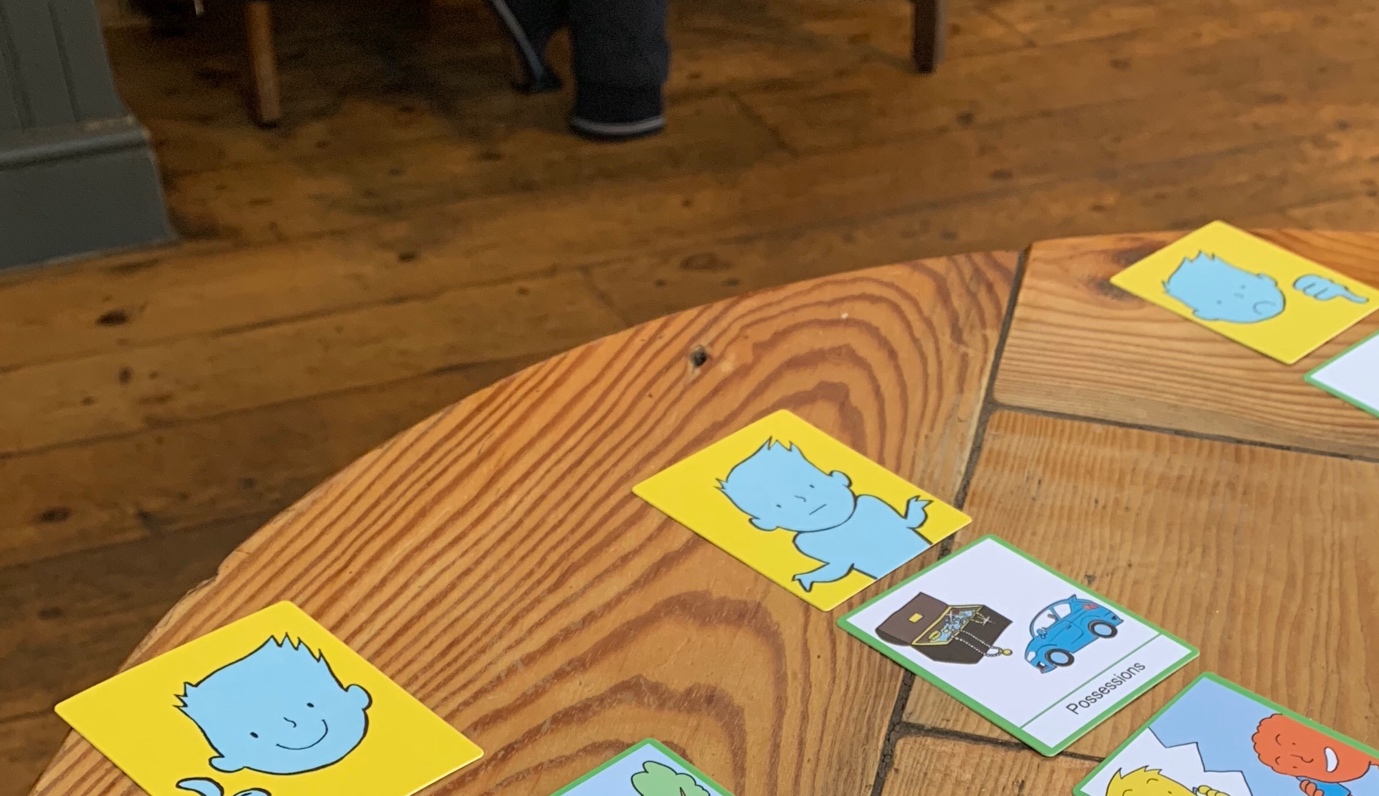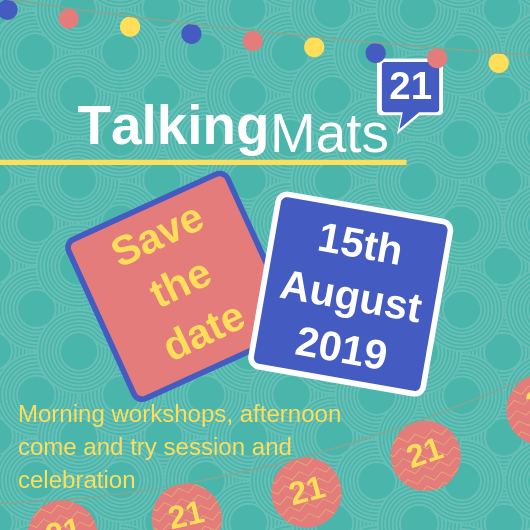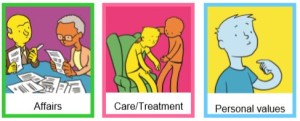The first week of January is barely over and we are about to tantalise you with 3 new Advanced online training sessions.
This format has proved very effective to introduce and support the use of our new Advanced Resources for those already trained in Talking Mats. Between February and June we will hold Advanced online training for;
- Sexual Health and Relationships
- Thinking Ahead * new edition for 2025
- Capacity – a resource to enable supported decision making.

What does the Advanced training look like?
- It is delivered live via Teams and facilitated by expert practitioners in the field
- The numbers are limited to allow interactive activities and discussion.
- It aims to improve skills and application for practice.
- It lasts for 3hrs (comfort breaks are included!)
What does it include?
- Why this resource is needed.
- How to use the Resource in practice.
- The opportunity to reflect and consider the impact of using this resource.
- Questions and feedback.
Cost?
£95 including resource
February to June 2025. .
- 5th February 1.00pm – 3.30pm – Sexual Health and Relationships SOLD OUT! New dates coming soon
- 19th March 9.30am – 12.30pm – Thinking Ahead 2025 edition.
- 24th April 9.30am – 12.30pm – Capacity, enabling supported decision making. (date to be confirmed)
There are 30 places available for each event on sale in the shop on our website.
You will only have access to the Advanced training if you have completed the Foundation Training and have an account on our website. If you are unsure or cannot see the Advanced training in the shop please contact info@talkingmats.com
Want to come on the Advanced Training but not yet Foundation Trained? Find out how to make 2025 the year you become a Talking Mats practitioner.
Licenced Trainer and co-developer of the Funeral Planning Resource, Gillian Robertson is running Talking Mats Foundaion Training with specific sessions relating to the Resource. To reflect the working hours that practitioners interested in this may we are offering these sessions outside the 9am-5pm ‘norm’.
- Live video link (Teams) over 4 sessions, from 7pm until 8.30pm. 16th October, 23rd October, 13th November and 4th December (all sessions must be attended). 16 places available
- Face to face training at our headquarters in Stirling. 2 half day sessions, 7th February 2024 and 6th March 2024 (both sessions must be attended). 8 places available.
Gillian Robertson, an Interfaith Celebrant with a background in Special Education, instigated and drove this project with funding from the Big Lottery Awards for All. In a previous blog she describes her motivation and the early stages of the project.
Here’s a bit more information on the topics and who might use them.

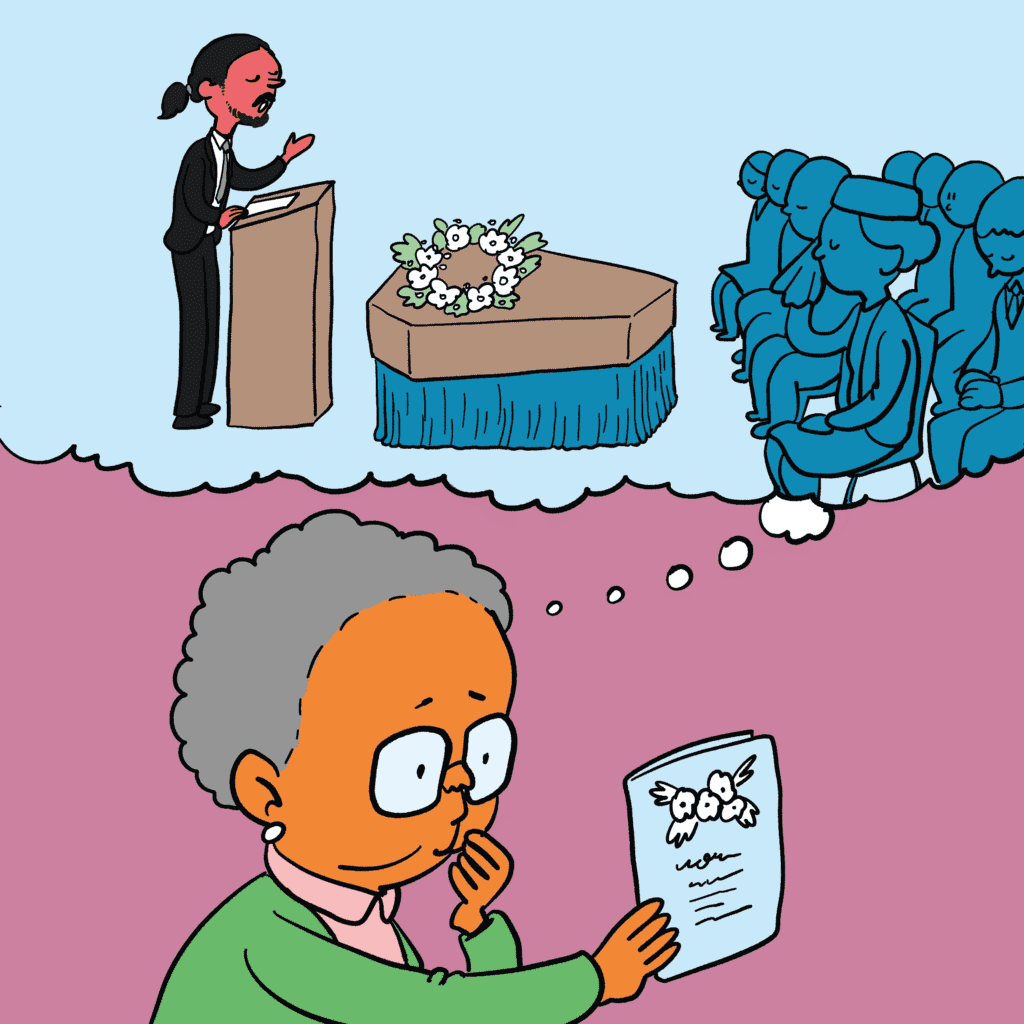
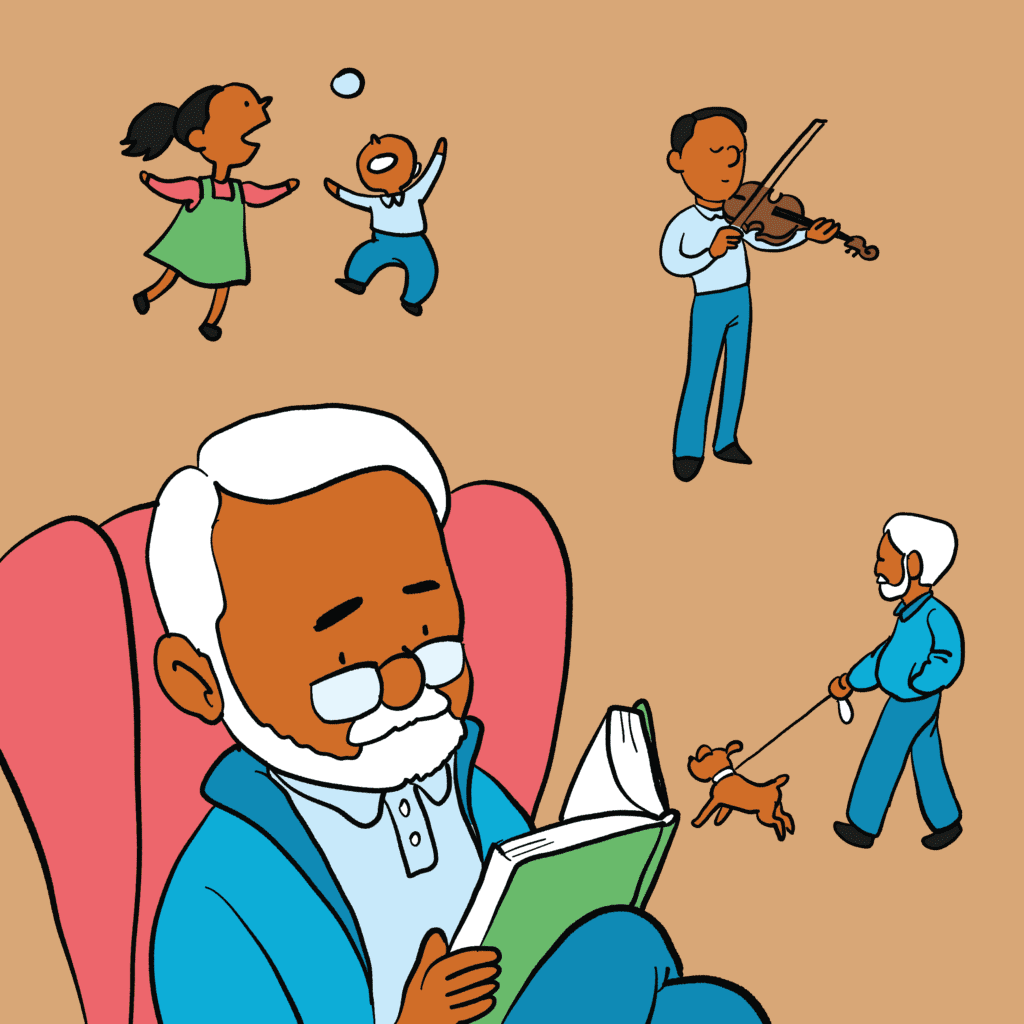
Funeral planning – this topic supports the initial conversation in planning a funeral leading to decisions about what someone would or would not like. It is particularly useful when planning for the future but can also be used by a celebrant / religious leader or funeral director to discuss what the family want for their loved one after a death has occurred.
Funeral Service – this topic supports the conversation which would follow on from Funeral Planning, leading to decisions about what someone would like or not like for the actual funeral service. Recording the first mat on this topic is a useful tool to refer to as plans progress. Who carries out this conversation depends on the context it is being used in. For example, if planning the service of a family member who has recently died then this is a very helpful resource for the celebrant or religious leader.
Eulogy – This topic supports conversations which highlight the important themes that someone would want included in their Eulogy. It is most useful when planning a service for someone who has recently died and relevant for the celebrant / religious leader to carry out when planning the service. The testing phase also highlighted that this topic can be used as part of the grieving process in a reflective way to help someone with learning disabilities remember the person who has died.
At the close of the project, with the testing phases completed, Gillian reflected and summed up the importance of this resource beyond the planning of funerals.
“The values behind Talking Mats are about making sure that everyone has a voice. If we deny people the ability to be heard, we deny them their human rights. When people’s voices are heard, improvements in their lives can be made.”
Foundation Training based on the resource is now available to book. There is a 20% discount if you attended the launch seminar and have the code to use at the shop checkout.
Many thanks to Dr Sally Boa, Head of Education, Research and Practice Development at Strathcarron Hospice in Stirlingshire, for this latest guest blog – linking to her great presentation at our TM is 21 event in August. Sally’s presentation – Talking Mats and Palliative care – focused on using Talking Mats in Palliative and End of Life Care, and included information about the Talking Mats ‘Thinking Ahead’ resource – here Sally shares her own experiences:
Talking about death and dying and making plans for the future is difficult to do. This is partly because no one likes to think about their own mortality and partly because as a society we don’t talk about it. I work in a hospice where people are encouraged to talk about the care and treatment they would want as their condition deteriorates. Even here, these conversations can be difficult, particularly if someone has communication or cognitive difficulties, if there is uncertainty about prognosis or if there are different opinions within the family. The ‘Thinking ahead’ Talking Mats resource is a great tool to use to enable these conversations to happen. In my presentation at the ‘Talking Mats is 21’ event, I provide some background about how the resource was developed. I have used it to support those with communication difficulties to have a voice and also with people who simply find this a difficult topic to think and talk about. Use of the Mats helps people to think through the issues one at a time and see for themselves how they feel about things in relation to one another. Most importantly, it helps open up the conversation about the future and helps people to prioritise and see for themselves what they need to do in relation to making plans for the future. Then they can get on with living and doing the things that are most important to them.
A most memorable example of using Talking Mats with someone towards the end of life is when I was asked to work with ‘Gill’ who had severe communication difficulties. I used the ‘Thinking ahead’ resource with her and found out that she had made many plans in relation to sorting out her affairs (e.g. power of attorney, funeral arrangements). She hesitated when I showed her the ‘making memories’ symbol and at the time I couldn’t work out why. To finish the session, I used the ‘indoor interests’ symbols with Gill and we had a great conversation about all the things she enjoyed doing. When I gave Gill the ‘arts and crafts’ symbol, she became really animated, and was able to tell me that she wanted to finish creating a memory book of photos that she had been making up for her family. Using the Mats, Gill managed to convey why she had hesitated with the ‘making memories’ symbol. Following on from this, we had a conversation with the hospice creative arts coordinator who was able to support Gill to complete, not only her memory book, but also other creative pieces. In her last few days of life, Gill was able to identify and work towards really important goals and left some amazing memories for her family.
To find out more about our Thinking Ahead resource, which is available to those who have accessed our Foundation Training – follow this link – https://www.talkingmats.com/product/thinking-ahead/
If you haven’t accessed our Foundation Training yet – find out more here https://www.talkingmats.com/training/foundation-training/
Rachel Woolcomb, our Talking Mats OT Associate, shares a recent personal experience where she used Talking Mats to support a difficult conversation:
The vision of Talking Mats is to improve the lives of people with communications difficulties. I have been reflecting recently on the definition of ‘communication difficulties.’
When I first heard about, and started to use Talking Mats 10 years ago, my perception was that it was fantastic for those that could not speak but I must admit I didn’t really consider using it with people who, such as myself, could use their voice to communicate.
Over the years as my understanding has developed, and I have looked further into the use of Talking Mats as a ‘thinking tool’ I have come to a different conclusion.
I would like to suggest that at some points in our lives, each one of us is likely to experience a communication difficulty. I don’t mean that we cannot physically speak, but that we cannot express what we really want to say in words. Perhaps a topic is too difficult to talk about with someone so we don’t bother, or we are overwhelmed by the subject that we don’t really know where to start.
One such subject is that of death and dying.
We know it will happen to us all one day but to talk openly with loved ones, is for some reason, too much to comprehend, too emotive, or considered bleak.
I am very fortunate enough to have grandparents in their 90’s however the conversation about their wishes for the future goes unspoken. It is a challenge for my parents to raise the issue therefore it remains the big unknown.
This is a common problem. In 2009, The National Council for Palliative Care wanted to address this issue and set up the Dying Matters Coalition in England and Wales, to help people talk more openly about dying, death and bereavement and to make plans for the end of life.
Talking Mats have produced a set of topic cards called ‘Thinking Ahead.’ https://www.talkingmats.com/product/thinking-ahead/
These were created in consultation with Strathcarron hospice to help people with advanced illness or long term conditions to think ahead and plan for the future. The three topics in the set are: Affairs, Care and Treatment and Personal Values.
My Mum was interested in my role with Talking Mats and wanted to understand what it was all about. We had already started to talk about the challenges of having difficult conversations, especially about death, and therefore over a drink, in a relaxed coffee shop, we embarked on a journey of discovery using a Talking Mat. My Mum as the Thinker and myself as the Listener .
She used the Talking Mat to help her think about things she had not considered and was able to make plans about what she wanted to do next. I heard her wishes and her thoughts, on why certain things were important to her. It was a very special time, facilitated by a Talking Mat.
My challenge to you as readers of this blog is to ask yourself ‘what do I have difficulty talking about’ – A Talking Mat just might be the answer!
Another resource you might find helpful is ‘Let’s Talk about Death and Dying’ – www.ageuk.org.uk
Rachel will be running a ‘Talking Mats as a Thinking Tool’ workshop at our Talking Mats is 21 Event is in Stirling on Thursday 15th August 2019. Dr Sally Boa from Strathcarron Hospice will also be running a ‘Talking Mats in End of Life Care’ workshop at this event. Thanks to funding from NHS Forth Valley endowment committee the event is free but you do need to book your space https://www.eventbrite.co.uk/e/talking-mats-is-21-tickets-62362171935
You can come to the morning only, afternoon only or come for the whole day.
If you can’t come to our event watch out for out blogs and social media celebrating the reach of Talking Mats for 21 days before the 15th of August. Please join in with your contributions using the hashtag #TMis21. For 21 days after our event we will be having a special Birthday offer! Watch this space, more to follow …….
We are all looking forward to celebrating Talking Mats is 21 on the 15th August
The morning is aimed at people who are experienced Talking Mats practitioners and will extend thinking and Talking Mats practice. There are an interesting range of parallel sessions to choose from. Each participant will get to choose three topics to attend.
- Talking Mats as a Thinking Tool
- Embedding Talking Mats in Schools
- Talking Mats in Forensic Settings
- Talking Mats in End of Life Care
- My experience of using Talking Mats as a parent
- Talking Mats and Positive behaviour Support
- Talking Mats and Supported Decision- Making
- Empowering people with Learning Disabilities to be Talking Mats Listeners and Trainers
- Talking Mats and Children’s Mental Health
The afternoon is more informal and there will be an opportunity to engage with some of our partners – see how they use Talking Mats and try things out . There will be posters on the use of Talking Mats in lots of different places and for a wide range of applications.
Plus there will be lunch, cake and a few bubbles !
Thanks to funding from NHS Forth Valley endowment committee the event is free but you do need to book your space https://www.eventbrite.co.uk/e/talking-mats-is-21-tickets-62362171935
You can come to the morning only, afternoon only or come for the whole day.
If you can’t come to our event watch out for out blogs and social media celebrating the reach of Talking Mats for 21 days before the 15th of August .Please join in with your contributions using the hashtag #TMis21. For 21 days after our event we will be having a special Birthday offer! Watch this space, more to follow …….
This new resource has been developed by Strathcarron Hospice and Talking Mats to help people with advanced illness or long term conditions to think ahead and plan for the future.
It consists of a booklet and 3 topic symbol sets: Affairs; Care/treatment; Personal values
It can be used to help people have conversations about:
• the extent to which their personal affairs are sorted;
• what they would or would not consider about future treatments and care;
• what is going well/not going well in relation to their personal values
It is widely recognised that having discussions about end of life issues can enable people to remain in control for longer and help them to identify the care and support they need and want as they approach death. In spite of this, in Scotland:
- 74% of people have not discussed what their wishes would be if they did not have long to live
- 79% of people don’t have any written plans for their end of life care, financial wishes or funeral plans
- Only 35% of people have written a Will
It can sometimes be difficult for people to start conversations about planning for end of life and people this is exacerbated if people have specific difficulties communicating their thoughts and feelings because of symptoms, fatigue and emotional factors. Before initiating this type of conversation it can be helpful to check the extent of a person’s understanding of their illness and whether or not they want to talk about the future.
The importance of having conversations and making plans for end of life has been highlighted as being relevant for people in the early stages of life limiting illness as well as for those nearing the end of life. There is evidence that people who have Advance or Anticipatory Care Plans in place are more likely to receive the care that they want and treatment can be less invasive. ACP is a process rather than a one-off conversation. It is acknowledged that ACP discussions should take place in appropriate settings with sufficient time to enable to people to consider and weigh up different options. ACP should also be developed in line with peoples’ personal values and goals (Sinuff Tasnim, et al.(2015) “Improving end-of-life communication and decision making: the development of a conceptual framework and quality indicators.” Journal of pain and symptom management 49.6 2015): 1070-1080).
Perhaps we should think about planning ahead whether or not we have advanced illness or long term conditions??
Training
To get the most out of the resource we run half day advanced training courses which will include the Thinking Ahead Resource. This course will be relevant to you if you:
- have attended a Talking Mats foundation training and are experienced in using Talking Mats with adults
- want to extend your use of Talking Mats and consider its role and application to advance care planning
- want to discuss sensitive topics around end of life care
Please contact us at 01786 479511 if you are interested in future dates.
Do you want to introduce Talking Mats to people with a communication disability and autism, but know they will need support to learn it?
We are holding a 2 hour seminar on the 1st of February in Stirling to share ways of supporting people with autism to learn to use Talking Mats and express their thoughts.Twilight ASD Seminar
Do you want to help people think about the future and what they might want to have in place at end of life? Talking Mats and Strathcarron Hospice have developed a powerful new resource to support these sensitive conversations and an advanced course is being held in Stirling on the 21st February and in London 27th of March http://www.talkingmats.com/training/specialist-seminars/
These opportunities are only open to people who have attended Foundation training
We are working with our colleagues at Strathcarron Hospice to develop a resource for Advance Care Planning which should be available early in 2018.
This poster illustrates how we are developing the resource:
2017 TM and Advance Care Planning
During the pilot phase our colleague Sally Boa (Head of Palliative Care Education, Research and Practice Development at Strathcarron Hospice) received the following moving story from Lorraine. We are extremely grateful to Lorraine for allowing us to publish it.
“My name is Lorraine and I am a carer for my husband who has cancer and is a palliative care patient.
I have been involved as a volunteer with Susan at Strathcarron Hospice since February this year. This was a group formed from the community put together by volunteers to get their help and opinions of thinking ahead and to understand what a loved one wants for their future and awareness of information and services available to people caring for someone with a long term illness/palliative care, but most importantly how best to get a loved one to open up and talk about their feelings and what they want for their future and arrangements.
Personally it has been for me interesting, draining and emotional at times, but this journey I have been on has made me think and realise that these are very important issues that need to be talked about with my husband and family.
I had tried to get Gordon to talk about these things, but it was difficult to bring the subject up. He just changed the subject. I tried leaving booklets lying on the table when I was out, but if he did look at them he never mentioned it.
Thinking about death is very emotional and stressful subject to talk to someone you love about. I know how I felt with these thoughts going round in my head and it was not nice. As for our two sons they seem to have accepted the situation now, although it was difficult. We have never lied to them and tried to explain what’s going on, but finding the right words isn’t easy. Moving to acceptance instead of denial is very, very hard on everyone.
I also have been involved with trying out Communication Cards (Talking Mats) which had been designed to help people who have difficulties in communicating. I went to the Hospice where I was asked some questions that I answered using the cards. I answered using the cards under the guidance of “feelings” I was surprised to find I had more positive replies than any of the others, I feel the cards would help people show their feeling better. I was asked if Gordon would be interested in doing the same. Sally emailed me a photo of my cards/answers, and I showed it to Gordon and I took the chance and asked him and he said yes. Sally came to the house and they did the task using the cards with no input from me {I kept very quiet ha ha}. The benefit Gordon got from this was really good. He was quite surprised to find he had placed more cards on the positive side as well his thoughts and feelings and he felt good about actually seeing that in front of him.
When Sally left I thought to myself this is my chance to approach the subject but again deep down I was scared as the last thing I wanted was to upset him.
I approached the subject with Gordon…. how about we continue chatting about what he wanted for his future and arrangements etc. I put it to him he knew what I was involved with for months with Susan and Mandy and that he was always interested to hear what we were doing but the truth was I still didn’t know what he wanted, I only knew he wanted a church service and burial. We sat at the table and talked about everything, I took notes what Gordon was telling me he wanted about everything.
I am an awful one for my Diary/ Journals I recorded everything we discussed finances, lawyer, wills, his wishes, Hymns he wanted, service at the graveside,what was to be given to family etc. in fact everything we could think of is now recorded and in one place. Both our boys will be told and where to find it. Jokingly to make it a bit light hearted I said I could go first you know, so we both took the opportunity to write and record all my wishes which is listed in the same journal.
Afterwards I really don’t know how to explain it but I felt a tonne weight off my shoulders, I now know everything I need to know.
More important for me I’ll never need to discuss it again with Gordon the book will be locked away safe and we can get on with our lives.
Please try and find the right time to talk, it’s very important and it will stop a lot of stress and emotional turmoil at what would be a very sad time for all.”
We are currently working to develop a Talking Mats resource to support conversations relating to Advance Care Planning (ACP) with staff and patients from Strathcarron Hospice. People who use hospices often have specific difficulties communicating their thoughts and feelings because of advanced illness and emotional factors.
Sixteen staff from the multidisciplinary team at Strathcarron Hospice were trained to use Talking Mats by Sally Boa who is Head of Education, Research and Practice Development at Strathcarron Hospice and also one of our accredited trainers.The staff trained used it successfully with patients in the hospice and found that they could use it with a range of patients for a variety of purposes: getting to know someone; identifying goals; discharge planning.
A sub-group of staff attended a workshop with members of the Talking Mats team to discuss the potential use of Talking Mats to support conversations relating to ACP. Topics and options were agreed. These were then presented to a wider forum of staff from Highland Hospice for validation and checking. Three main topics to support ACP conversations were identified: Affairs; Care and Personal Values. New symbols are being developed and the resource will be trialled with a range of patients in the hospice setting.
Our hope is that Talking Mats can be used by trained staff in a hospice setting to support people to express their views and help them plan for the end of life and that it will also be helpful for many other people to consider future options in their lives.
We will write an update once the new resource has been completed.
 Online training login
Online training login 


